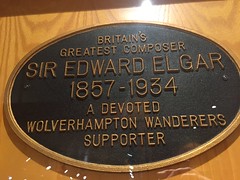Sir Edward Elgar GCVO OM 1st Baronet


Sir Edward Elgar GCVO OM 1st Baronet
(1857-1934)
composer, violinist, conductor, teacher, Master of the King's Music, organist (1885-1889), Knight Bachelor (from 1904), Order of Merit recipient (from 1911), Knight Commander of the Royal Victorian Order (1928-1933), 1st Baronet Elgar of Broadheath (from 1931), and Knight Grand Cross of the Royal Victorian Order (from 1933)
Died aged c. 77
Wikidata WikipediaElgar has the honour of being on the Abbey Road Studios
OpenPlaques
Family tree
friend of Alfred Rodewald , friend of George Robertson Sinclair and friend of Arthur Troyte Griffith
Commemorated on 20 plaques
Sir Edward Elgar 1857-1934 composer lived here 1890-1891
51 Avonmore Road, Hammersmith and Fulham, W14, London, United Kingdom where they lived (1890-1891)
Edward Elgar 1857-1934 Composer Often stayed and composed in this house
Long White Cloud, Monkey Island Lane, Bray, Maidenhead, United Kingdom where they stayed
Sir Edward Elgar composer (1857-1934) stayed here on his honeymoon May 1889
3 Alexandra Gardens, Ventnor, Isle of Wight, United Kingdom where they stayed
Sir Edward Elgar composer 1857-1934 opened and recorded in these studios on 12th November 1931
Abbey Road Studios, Abbey Road, London, United Kingdom where they opened and recorded
Sir Edward Elgar lived in a house on this site 1911 1921 Here he composed The Music Makers Falstaff The Spirit of England
44 Netherhall Gardens, Frognal, Hampstead, London, United Kingdom where they lived
Near this spot occurred, in 1898, the incident depicted in Variation No.11 of Sir Edward Elgar's Variations on an Original Theme (Enigma). Dan, a bulldog belonging to Dr. George Robertson Sinclair, Organist of the Cathedral, fell in the river during a walk with "G. R. S." and his friend, the composer.
south bank of River Wye, Hereford, United Kingdom where they walked
Sir Edward Elgar, composer, was a frequent guest of Alfred E. Rodewald owner of this house C.1900
Church Road, Saughall, Chester, United Kingdom where they was a frequent guest
Sir Edward Elgar, composer, became the University’s first Professor of Music in 1905
Bramall Concert Hall, University of Birmingham, Birmingham, United Kingdom where they was
Sir Edward Elgar, who rose from obscurity to become England's greatest composer for 200 years, was born on 2nd June 1857 at Broadheath near Worcester. He was organist, violinist, teacher, conductor and self-taught composer. After 1900 his compositions won International recognition, the best known being The Dream of Gerontus, The Enigma Variations, The Two Symponies, The Concertos for violin and cello, and Land of Hope and Glory. He drew his inspiration from the English countryside, saying "Music is in the air all around us". From 1878 to 1933 he was associated with the Three Choirs Festivals held in Worcester, Hereford and Gloucester. The statue shows him at the age of 54 in the robes of a Doctor of Music which he often wore when conducting at these festivals. Knighted 1904, Freeman of Worcester 1905, O.M. 1911, K.C.V.O. 1928, Baronet 1931, G.C.V.O. 1933, Master of the King's Musik 1924-1934. He died in Worcester on 23rd February 1934. This tablet was laid on the Fifthieth anniversary of the composer's death.
High Street (in front of the statue of Edward Elgar), Worcester, United Kingdom where they is commemorated
Edward Elgar 1857-1934
High Street (near the statue of Edward Elgar), Worcester, United Kingdom where they is commemorated (1981)
363 Oxford Street July 1921 - April 2000 HMV Site of the original HMV store Opened by Sir Edward Elgar in July 1921, the HMV store shaped the way people bought music for nearly a century In 1962 it played a significant role in the career of The Beatles. A 78RPM demo disc of the band was cut in the store's recording studio. This led to the Beatles' long-term recording contract with EMI The world's most famous music store
363 Oxford Street, W1, London, United Kingdom where they opened (1921)
The Kursaal. Harrogate Council's 1898 competition for the design of a Kursaal or "Cure Hall" was won by London architect Robert Beale, who worked with Frank Matcham, England's most celebrated theatrical designer. The Kursaal was opened by Sir Hubert Parry on 28th May 1903 and is the only remaining building of its type in the country. Intended to complement the town's other spa facilities the Kursaal contained many innovations that provided great flexibility of use. Renamed the "Royal Hall" in 1918, the building has been host to the greatest artists of the day - from Sir Edward Elgar to The Beatles. Following a complete restoration from 2006-8, Matcham's spectacular interior now contains more gold leaf than any similar auditorium in England. The much-loved building was reopened by HRH The Prince of Wales, patron of the Royal Hall Restoration Trust, on 22nd January 2008.
Ripon Road, Harrogate, United Kingdom where they played
Plas Gwyn Home of Sir Edward Elgar 1904-1911
On the corner of Hampton Park Road and Vineyard Road, Hereford, United Kingdom where they lived (1904-1911)
The Elgar Walk. To commemorate Sir Edward Elgar's many visits to Harrogate from 1912 to 1927 and his regular walk between the Hotel Majestic and Bog Field, this path was named the Elgar Walk in 1989. The first provincial performance of his second symphony took place in Harrogate in 1911.
Elgar Walk, Elgar Gardens, Harrogate, United Kingdom where they walked (1912-1927)
Hotel Majestic. The Hotel Majestic opened on 18 July 1900 as the finest hotel of the world's greatest spa. Built by Frederick hotels and designed by London architect G. D. Martin, the majestic has, for over a century, been the preferred address of visitors such as Winston Churchill, Edward Elgar, Errol Flynn, 'James Herriot', G. B. Shaw and several Prime-Ministers. Bombed on 12 July 1940, the Hotel Majestic served as an RAF Reception Centre during the Second World War. It was extensively refurbished between 1998 and 2002.
Ripon Road, Harrogate, United Kingdom where they stayed
Edward Elgar was Organist of this church from 1885 to 1889. For which he composed many of his earlier sacred works
St George's Catholic Church - Sansome Walk, Worcester, United Kingdom where they was organist (1885-1889)
Sir Edward Elgar (2 June 1857-23 February 1934) Master of the King's Musick composer of Land of Hope and Glory and the Enigma Variations lived here
2 College Precincts, Worcester, United Kingdom where they lived
Sir Edward Elgar (1857-1934) famous composer often stayed here as the guest of his friend Dr Charles William Buck
Market Place, Settle, United Kingdom where they stayed
Edward Elgar 1857-1934 composer, lived here 1861-1863
2 College Precincts, Worcester, United Kingdom where they lived (1861-1863)
Sir Edward Elgar Britain's Greatest Composer Sir Edward Elgar 1857-1934 a devoted Wolverhampton Wanderers Supporter
Molineux Stadium Waterloo Road, Wolverhampton WV1 4QR England, Wolverhampton, United Kingdom where they was

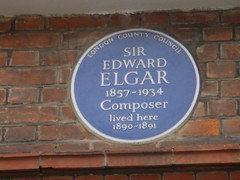
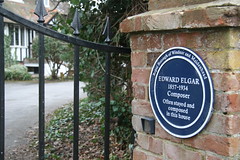
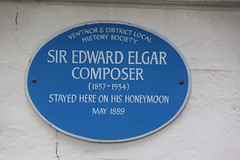




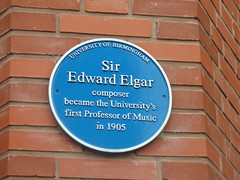





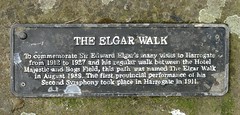

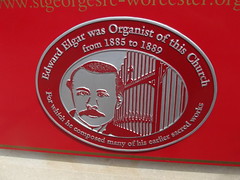
_Master_of_the_King's_Musick_(Worcester_Civic_Society).jpg?width=250)

.jpg?width=250)
